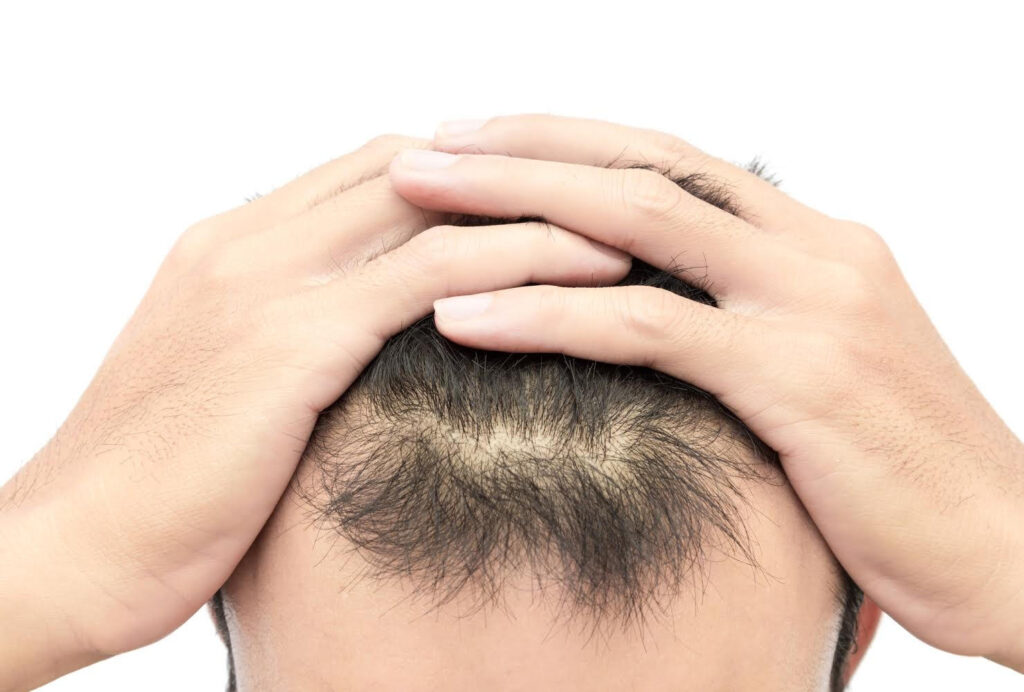If you watch TV or listen to the radio, you see and hear ads for testosterone-boosting supplements all the time. Without more research, it might seem like high testosterone is everyone’s goal. In reality, many people follow special diets and take medication to reduce the effect of androgens such as testosterone.
Anti-androgen chemicals stop androgens from affecting the body. They do this by attaching to androgen receptors.
They don’t block all androgens, which isn’t desirable for most people. They can come close to doing so, depending on the complaint and treatment regimen.
Some people take factory-made anti-androgen medication. Others use foods and herbs with natural anti-androgen effects. Some foods and herbs with anti-androgen properties include soy and spearmint.
There are a wide variety of uses for anti-androgen treatments. Here are ten common reasons to use anti-androgens.
1. Anti-Androgens in Transfeminine Hormone Replacement Therapy
Anti-androgen medication is a major part of transfeminine people’s biomedical transition journeys. “Transfeminine” is an umbrella term. It includes transgender (trans) women and nonbinary people assigned male at birth who feel close to womanhood or femininity.
Doctors often prescribe young transfeminine people anti-androgens. They block the effects of testosterone before puberty takes full effect. One of the biggest benefits is that it gives young people time to figure out their feelings about gender and their body image.
Many transfeminine and gender-questioning children take anti-androgens as puberty blockers. They do this before taking estrogen while they consider how they feel and what they want to do.
Doing this before going through puberty with either major sex hormone (testosterone or estrogen) helps kids avoid permanent sex characteristics they may not want later in life. This prevents questioning children from making mistakes by making hasty decisions under pressure. It also tends to reduce the need for treatments, therapies, and surgeries to treat gender dysphoria later in life.
Many transfeminine people on estrogen hormone replacement therapy (HRT) take anti-androgens as well. They enhance estrogen’s effects. They’re also useful in balancing hormones for those who haven’t had an orchiectomy (testicle removal).
A common myth is that anti-androgens aren’t helpful for transgender adults far past puberty. The truth is that they block testosterone as well for someone 60 years old as they do for someone 6 years old.
They don’t 100% reverse testosterone’s effects, but they do have a significant impact on appearance. Key effects include softened skin and reduced body hair.
2. Anti-Androgens Fight Hair Loss
Another common use of anti-androgen medication is for fighting hair loss.
Funnily enough, this use is common among transmasculine people on testosterone HRT. That group includes trans men and nonbinary people assigned female at birth who feel close to manhood or masculinity. Cisgender (cis for short, meaning not trans) men also use HRT, often later in life as testosterone levels do drop with age.
An effect of testosterone that upsets many such cis men and transmasculine people is pattern hair loss. Finasteride is an anti-androgen drug often used as a solution to this problem. RU58841 is another anti-androgen many hair loss researchers study.
Anti-androgens are also a big help in fighting women’s’ pattern hair loss. The condition is somewhat less well-known than the male variety, but it’s still common.
3. Avoid Painful Priapism With an Anti-Androgen Drug
If you’ve seen or heard ads for erectile dysfunction drugs, you’ve heard the warnings about erections lasting for more than four hours. This condition is called priapism and hurts a lot. It can lead to permanent penile tissue damage if it isn’t treated soon after taking hold.
Legal and illegal drugs, medical conditions, and high testosterone levels all raise the risk of priapism. Anti-androgens are a huge help for stopping the recurrence of this uncomfortable problem for many sufferers.
4. Use Anti-Androgens to Battle Prostate Cancer
Many cis men strive to maintain high testosterone levels into old age for boosted energy, strength, and virility. Those priorities have to change when a person gets prostate cancer. Testosterone helps prostate cancer grow, so reducing testosterone is a good way to fight it.
Nonsteroidal anti-androgens are a common treatment for this kind of cancer. They’re sometimes used as an alternative to castration or with it.
Anti-androgenic drugs manage prostate cancer instead of curing it. They can be effective enough that patients decide against chemotherapy or put it off as a last resort.
Some prostate cancer patients aren’t interested in chemotherapy. If that’s you, talk to your doctor about this option. The consensus is that anti-androgens are a very effective way to help manage the condition.
5. Anti-Androgens Treat Mood and Sexual Issues
In addition to developing characteristics like facial hair and a deep voice, androgens affect mood and sex drive. Too-high levels of testosterone may lead to aggression and sexual issues. People with conditions like anger management problems, hypersexuality, and paraphilias may benefit from anti-androgens.
Some seek treatment for these mental conditions to ease discomfort. In other cases, courts may require anti-androgen treatment for sex offenders. They’re thought to decrease the likelihood of repeat offenses by lowering users’ sex drive.
6. Anti-Androgens Improve Skin Quality
A common reason doctors prescribe anti-androgens is to improve skin quality. High androgen levels can cause oily skin and breakouts.
They’re a rare drug for men’s acne. Most people feel the risks of gynecomastia and sexual dysfunction outweigh the benefits.
Yet, doctors have tested them for this purpose. They may be the best option in cases of severe acne.
It’s more common for women to use anti-androgen drugs to fight acne because the effects don’t often compromise their desired appearance. People with skin conditions like hidradenitis suppurativa and seborrhea also get relief from anti-androgen medications.
7. Lower Unwanted High Androgen Levels
Every application of anti-androgen medications involves reducing androgens—that’s what anti-androgens do by definition. Yet, sometimes the main complaint isn’t hair loss, gender dysphoria, acne, or another specific condition. In some cases, high androgen levels are the full reason for treatment.
Some cis women have elevated androgens. It’s common with polycystic ovary syndrome (PCOS). Women may develop characteristics like facial hair, a deeper voice, broader shoulders, and other traits considered masculine.
While plenty of women are happy to rock these features, others aren’t. Some don’t want the features for personal reasons, but there’s also high societal pressure for women to lose them.
No matter the reason for a person’s discomfort, anti-androgens counteract those features well. As with many of these uses for anti-androgen medication, a benefit of using anti-androgens for this purpose is that they don’t have to be permanent.
Say, for example, someone with PCOS takes anti-androgens to stop dense facial hair. Stopping the drugs lets the hair and other features they blocked come back.
That’s not ideal for everyone, but it’s a great option for people who aren’t yet sure what they want from their appearance. It’s also a good chance to change one’s mind if the drugs have any unwanted effects on mood, libido, or anything else.
8. Anti-Androgen Drugs Slow Down Early Puberty
As mentioned above, a common use of anti-androgen drugs is blocking puberty in trans children. They’re also sometimes used to block puberty in cis boys. You might be wondering why someone would elect to block puberty if they know they want its effects later down the road.
Precocious puberty, or early puberty, is a term for when kids develop secondary sex characteristics before age 8 (for cis girls) or 9 (for cis boys). It’s sometimes caused by cancer and other atypical conditions but is more often a kind of natural variation.
The condition isn’t always a problem, but kids and their families don’t always want its effects.
There are two kinds of early puberty: isosexual and heterosexual. Isosexual precocious puberty is when young children develop characteristics consistent with what’s expected for their sex assigned at birth. Heterosexual precocious puberty is when the new characteristics are associated with the other binary gender.
Doctors prescribe anti-androgens to slow down the condition’s progression. They can block puberty’s effects until a more typical age. At that point, patients stop the medication, and puberty’s effects take hold within a matter of months.
9. Try Anti-Androgen Birth Control Pills
Another use of anti-androgens is as part of birth control medications.
Oral birth control often contains progesterone. Various pill-makers employ many kinds of progesterone. Some are androgenic, while others are anti-androgenic.
Birth control pills with anti-androgenic ingredients have a wide range of benefits apart from preventing pregnancy. They help users manage their menstrual cycles, reducing heavy flow and pain. Along with being convenient, lighter menstrual flow helps manage anemia.
They help PCOS patients manage the condition by shrinking ovarian cysts. The pills can also reduce unwanted facial hair. Birth control is often the main use of anti-androgen drugs used to treat high androgen levels, acne, female pattern hair loss, and other complaints.
Just as anti-androgens work as puberty blockers and make good temporary solutions for other problems, part of the appeal of oral birth control with anti-androgenic ingredients is that it’s not permanent.
10. Treating High Blood Pressure With Anti-Androgens
Some people with high blood pressure, or hypertension, have higher-than-average androgen levels. Elevated aldosterone is a common issue. For this reason, doctors have trialed anti-androgens such as spironolactone to treat high blood pressure.
It’s not a common treatment for hypertension because it’s unusual for high androgen levels to be a major cause of a person’s high blood pressure. Spironolactone in particular may do more harm than good when taken at high doses. Low doses don’t always do much to help, but they seem to help with other treatments in rare cases.
Anti-androgen drugs aren’t a doctor’s first choice to treat hypertension. Yet, they may well be worth exploring for high blood pressure patients that have tried countless other treatments.
You may have hypertension and the typical drugs aren’t working. Consider asking your doctor if your condition could be related to aldosterone levels or another androgen imbalance. An anti-androgen could be the unusual treatment you need to tackle your condition.
Take Anti-Androgen Drugs and Be Sure They Work
These five common uses of anti-androgenic foods and medication are proof that it’s a safe and effective group of chemicals. After learning what anti-androgens can do for you, you may be wondering how you can use them and be sure they work.
The most important thing to do before starting an anti-androgen treatment is to consult a doctor. Professional guidance is valuable when trying any medical treatment, but anti-androgens are serious business.
Messing with your hormone levels without knowing what you’re doing could put you in a bad place health-wise that’s hard to get out of. Plus, most anti-androgen medications aren’t available without a prescription.
You may be curious about what anti-androgens could do for you but don’t yet feel ready to start a drug regimen. A good way to explore is by adding anti-androgen rich foods to your diet. If you feel better with them and think you might want a more structured treatment, talk to a doctor.
Another way to succeed when taking anti-androgens is to stay on top of your schedule. You don’t have to worry about this if you’re using anti-androgen foods. You do if you’re taking an anti-androgen drug.
As with any other medication, you have to be consistent for anti-androgens to work. Don’t use it now-and-then or you’ll be at risk of dealing with problems like mood swings, inconsistent libido, and acne.
Persistence is also key to success with anti-androgens. If you take one kind that doesn’t work, don’t give up on all of them. Talk to your doctor to test out another drug instead.
The Articles You Need for a Fuller Life
Now that you know these five uses of anti-androgen drugs and how to use them, you can decide whether it’s a medical solution that’s right for you. If you want information about more products and tips to enrich and better your life, you’re in the right place.
We have a wide selection of all kinds of lifestyle and business tips. There’s something for everyone. Click on another article to start your journey to an improved life.




